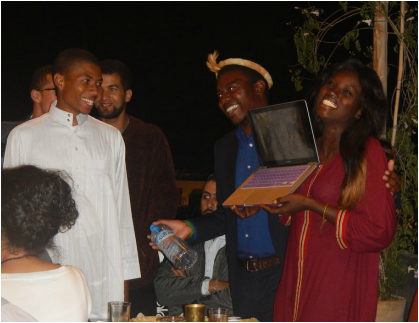Written by CorpsAfrica Volunteers Ms. Ndeye Awa Gueye (Senegal), Mr. Lahcen Chanchaf (Morocco), and Mr. Emas Potolani (Malawi)
Hello Dear Readers,
This is our first cross-country blog done by three CorpsAfrica Volunteers, Emas Potolani (Malawi), Lahcen Chanchaf (Morocco), and Awa Ndèye Gueye (Senegal). After an amazing and far-fetched ten days of the All Country Conference, October 4-15, 2016 in Morocco, Emas Potolani proposed to work on something together and involve three Volunteers, one from each country. The idea was to implement a simple project that all Volunteers might adopt and share with the communities they live in when they go back to their sites. This project can be done in one day by three people or less – and with no money.
We wanted to follow up on the Global Hand-Washing Day (GHD), which is a campaign to motive as well as to mobilize people all around the world to improve their hand-washing habits by washing their hands with soap at critical moments throughout each day. The GHD takes place on October 15th of each year. The event is indeed dedicated to raising an understanding about the significance of hand washing with soap as an efficient way to prevent disease and save lives.
Our cross-country team of Volunteers from Malawi, Morocco and Senegal decided to design and test a prototype of a hand washing device. This prototype was to suit and fit the cultures and traditions of the people in the three countries and beyond. The device is known as Tippy-Tap. It’s a hygienic, simple way to wash your hands with soap appropriately without necessarily touching the device with your hands, and especially in remote areas where there is no access to running water.
After working tirelessly on our design, we tested our first prototype in Azzaden Valley in the High Atlas Mountains in Morocco. It turned out that the people in the community liked our prototype so much to the extent of asking us to install the Tippy Tap on their front yard so they could be use it to wash their hands. Although there is access to running water in the village, the villagers in the Azzaden Valley found the Tippy Tap convenient and efficient in the farming fields where most people spend the entire day busy with their daily agriculture activities. This doesn’t mean that they don’t wash their hands in the fields, but the device will be an added value and make a difference in the way they use water.
Emas shared with us how the Tippy Tap is used in communities in Malawi to enhance sanitation. Community members assemble the Tippy Tap right outside a latrine and people wash their hands after. The interesting thing is that although this hand-washing devise is very simple to make and only requires less than 20 minutes to put together, not many people make it. Emas shared with us the amazing strategy he uses when teaching the his students on how to make this hand-washing device. We believe this is a great strategy in making children agents of sanitation, even when they go back to their homes. Children quickly learn and pick up new techniques and starting this simple revolution with them would indeed yield more positive results that would entirely amaze us all especially in sanitation.
We noticed that it was a new technique in the Azzaden Valley and we thought that joining our efforts in sharing our knowledge through this cross-country project would help our communities in Malawi, Morocco and Senegal and would be a good step towards fostering sanitation practices. With locally available materials in our communities, such as an empty bottle or container, strong ropes, 2 sizable sticks and one stick to support the water container, one can easily assemble a Tippy Tap and practice sanitation all day throughout the year.

